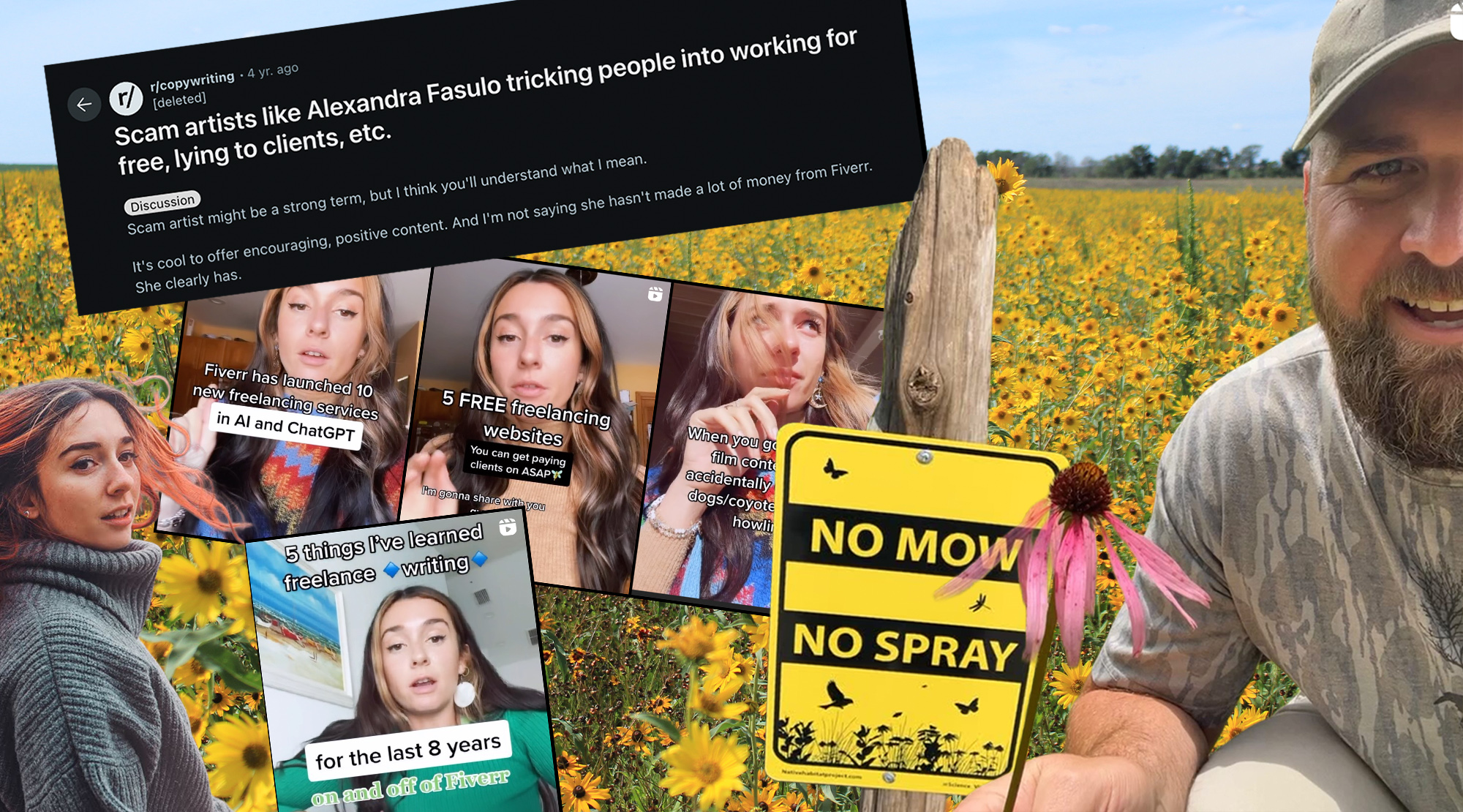Native habitat restoration doesn’t usually raise tempers, but it escalated into police reports and death threats this week thanks to what started as a well-intentioned PSA about land managmeent misinformation. Alabama-based Native Habitat Project founder and social media educator Kyle Lybarger posted a video to Instagram Monday warning people to avoid habitat restoration advice from alleged scammer and New York-based influencer Alexandra Fasulo.
Lybarger has since deleted his video due to threats to his safety. In it, Lybarger warned his followers in the native habitat community about Fasulo, who he said has grown her social media followings in different areas of expertise and sold classes to those unsuspecting followers before moving on to a new community and starting fresh. He avoided too many specific allegations and instead suggested concerned users could find out more by researching her track record online, including on places like Reddit.
Indeed Fasulo, who has 576,000 followers on Instagram, has posted videos on topics ranging from wealth transfer to freelancing to copywriting over the years. She has multiple Facebook accounts, including several that describes her as “The Freelance Fairy.” It’s not clear what, if any, formal training Fasulo has in any of the subjects she posts about. Her LinkeddIn account shows she has a bachelor’s in political science and government from SUNY Geneseo. Currently, Fasulo calls herself an “ecopreneur,” which she defines as “making money while saving the planet.” She’s using her platform to share her start-from-scratch farm pursuits in New York. Her platform promotes preservation of traditional farmland while also protesting corporate transition to solar farms. She also encourages followers to buy private farms as their current owners age out and retire from a lifetime of farming.
Fasulo admits to not having any gardening experience, but she’s still issuing blanket advice on everything from pesticides and pollinators to chemicals and chicken coops. She did not respond to Outdoor Life’s request for comment. While learn-with-me accounts are popular on Instagram, Fasulo uses her platform to make sweeping statements about land management without scientific attribution. They also contradict the good work of well-trained — and impactful — native-minded land managers. In one post she claimed that “one drop of a popular pesticide can kill an entire hive of bees.” While certain herbicide use has been linked to struggling bee populations, this is an oversimplification that’s not backed by research. Meanwhile, certain herbicides are one of the only effective ways to kill invasive plant species, and to make way for native habitat restoration.
“Correct information is really important,” Lybarger tells Outdoor Life. “Misinformation to the general public is, I think, the most damaging thing we can possibly do. If you make a ton of broad statements like ‘leaf blowers are bad, herbicide is bad, chainsaws are bad, livestock are bad, solar panels are bad’ — that’s harmful. It makes the [native habitat] community look bad. A leaf blower can be used for good and for bad.”
In response to Lybarger’s cautionary video, Fasulo posted her own video refuting his claims and introducing her own.
“A very prominent creator has incited mob violence on me, my farm and my family,” Fasulo says in the video posted Tuesday.. “All I am trying to do here is save the bees and the butterflies in the way that I feel called to do. I should be able to do that without having my life threatened.”
Lybarger and Fasulo both have about half a million followers each on Instagram. Lybarger has a forestry degree from Alabama A&M and was recently featured in The New York Times for using his social media platforms to educate the public about native ecosystems.
“It’s never about me personally gaining a following,” Lybarger says. “It’s about getting the correct information out there.”
Lybarger’s concern is misinformation about native plant management being widely distributed, which could lead to the loss of already endangered species — like leafy prairie clover, which has been federally-protected as endangered since 1991. It grows on eight private properties in Alabama that Lybarger knows of. He raised $100,000 selling native plant t-shirts then used most of that money to buy one of the properties while also helping five of the eight private landowners perpetuate the plant on their own properties.
“I love the native plant community and I love all the people trying to do good things,” Lybarger says. “I don’t want any harm to come to this community. I just want to make people aware.”
Beyond accusations of improper natural resource practices, Lybarger worries Fasulo will start offering land management classes for a fee. Fasulo deflects this by misquoting what Lybarger originally said and stating that she doesn’t currently sell classes. She makes no statement about any intentions to sell classes in the future.
Read Next: A Wildlife Photographer Was Wrongly Tagged in the Viral Baby Wombat Post. Then Came the Death Threats
Lybarger has now removed all mentions of Fasulo from his accounts due to harassment by her followers. He continues to post videos of himself out on Alabama landscapes identifying plants by name for viewers, which is how his native plant platform started in 2021.
“Death by a million cuts is what our natives are facing,” he says. “There’s a lot going against them and that’s even more reason why we should be putting the right information out about them.”
Read the full article here





